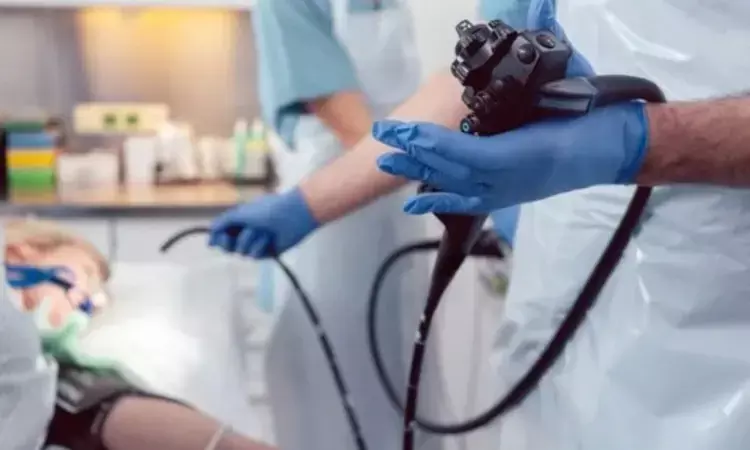- Home
- Medical news & Guidelines
- Anesthesiology
- Cardiology and CTVS
- Critical Care
- Dentistry
- Dermatology
- Diabetes and Endocrinology
- ENT
- Gastroenterology
- Medicine
- Nephrology
- Neurology
- Obstretics-Gynaecology
- Oncology
- Ophthalmology
- Orthopaedics
- Pediatrics-Neonatology
- Psychiatry
- Pulmonology
- Radiology
- Surgery
- Urology
- Laboratory Medicine
- Diet
- Nursing
- Paramedical
- Physiotherapy
- Health news
- Fact Check
- Bone Health Fact Check
- Brain Health Fact Check
- Cancer Related Fact Check
- Child Care Fact Check
- Dental and oral health fact check
- Diabetes and metabolic health fact check
- Diet and Nutrition Fact Check
- Eye and ENT Care Fact Check
- Fitness fact check
- Gut health fact check
- Heart health fact check
- Kidney health fact check
- Medical education fact check
- Men's health fact check
- Respiratory fact check
- Skin and hair care fact check
- Vaccine and Immunization fact check
- Women's health fact check
- AYUSH
- State News
- Andaman and Nicobar Islands
- Andhra Pradesh
- Arunachal Pradesh
- Assam
- Bihar
- Chandigarh
- Chattisgarh
- Dadra and Nagar Haveli
- Daman and Diu
- Delhi
- Goa
- Gujarat
- Haryana
- Himachal Pradesh
- Jammu & Kashmir
- Jharkhand
- Karnataka
- Kerala
- Ladakh
- Lakshadweep
- Madhya Pradesh
- Maharashtra
- Manipur
- Meghalaya
- Mizoram
- Nagaland
- Odisha
- Puducherry
- Punjab
- Rajasthan
- Sikkim
- Tamil Nadu
- Telangana
- Tripura
- Uttar Pradesh
- Uttrakhand
- West Bengal
- Medical Education
- Industry
Early Crohn's disease detection with capsule endoscopy improve long-term prognosis, finds study

A recent study by Yuya Ogino and colleagues created a scoring model for early Crohn's disease (CD) diagnosis based on results from small bowel capsule endoscopy (SBCE), which may help improve CD's long-term prognosis. The findings of this study were published in the Journal of Gastroenterology.
A minimally invasive technique called small bowel capsule endoscopy is utilized to see inflammatory alterations in the Crohn's disease small intestinal mucosa. The therapeutic utility of SBCE in CD has been highlighted in a number of professional guidelines. Currently, 2 grading methods are used to evaluate small bowel CD lesions found by SBCE: the Capsule Endoscopy Crohn's Disease Activity Index (CECDAI) and the Lewis Score (LS).
Although a number of studies have looked at the relationship between these 2 scoring systems, CD can present with a broad range of diseases, such as inflammation and stenosis, therefore it is hard to adequately identify the pathology using these scores alone. Using the results of the SBCE, this study created a scoring model for CD early diagnosis.
A total of 110 individuals with small intestinal mucosal lesions had their clinical and SBCE data gathered which was then randomly assigned them to derivation and validation groups. The accepted model was identified after variables were chosen for scoring models using univariate analysis. Each variable's score was determined by the odds ratio derived from multivariate analysis, and receiver operating characteristic analysis was used to look at the cut-off value for the CD diagnosis.
The model with the best fit (odds ratios of 4.97, 7.56, and 5.34, respectively) included age (≤ 30 vs. ≥ 31), linear degradation, and circumferential alignment. 4 points were assigned to the linear erosion score, four to the circumferential alignment, and three to the age of less than 30 years.
The scoring model's sensitivity, specificity, positive predictive value, and negative predictive value for diagnosing CD were 85.4%, 80.0%, 83.7%, and 82.1%, respectively, when the cut-off value was set at 7. Like the derivation cohort, the validation cohort showed an area under the curve of 0.93.
Overall, the advantages of optimizing therapy for Crohn's disease in remission using video capsule endoscopy (VCE) were confirmed by this investigation. The flare incidence was 25% for high-risk patients with a Lewis inflammatory score of ≥350 in the treat-to-target group and 70% for those receiving conventional therapy.
Source:
Ogino, Y., Sadashima, K., Yoshida, Y., Takedomi, H., Tsuruoka, N., Sakata, Y., Takamori, A., Hisamatsu, T., Matsumoto, T., & Esaki, M. (2025). Development of a capsule endoscopy scoring system for the early diagnosis of small bowel Crohn’s disease. Journal of Gastroenterology. https://doi.org/10.1007/s00535-025-02235-x
Neuroscience Masters graduate
Jacinthlyn Sylvia, a Neuroscience Master's graduate from Chennai has worked extensively in deciphering the neurobiology of cognition and motor control in aging. She also has spread-out exposure to Neurosurgery from her Bachelor’s. She is currently involved in active Neuro-Oncology research. She is an upcoming neuroscientist with a fiery passion for writing. Her news cover at Medical Dialogues feature recent discoveries and updates from the healthcare and biomedical research fields. She can be reached at editorial@medicaldialogues.in
Dr Kamal Kant Kohli-MBBS, DTCD- a chest specialist with more than 30 years of practice and a flair for writing clinical articles, Dr Kamal Kant Kohli joined Medical Dialogues as a Chief Editor of Medical News. Besides writing articles, as an editor, he proofreads and verifies all the medical content published on Medical Dialogues including those coming from journals, studies,medical conferences,guidelines etc. Email: drkohli@medicaldialogues.in. Contact no. 011-43720751


